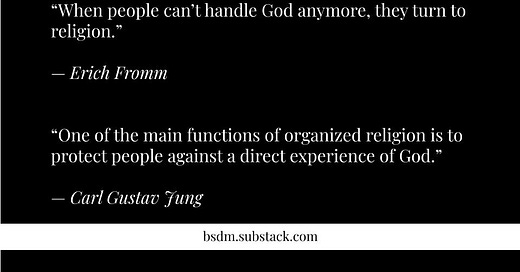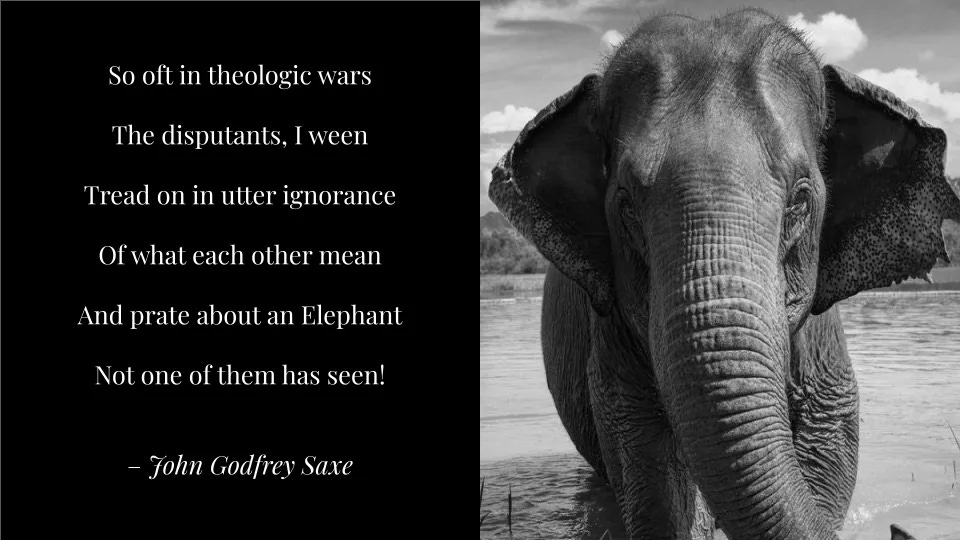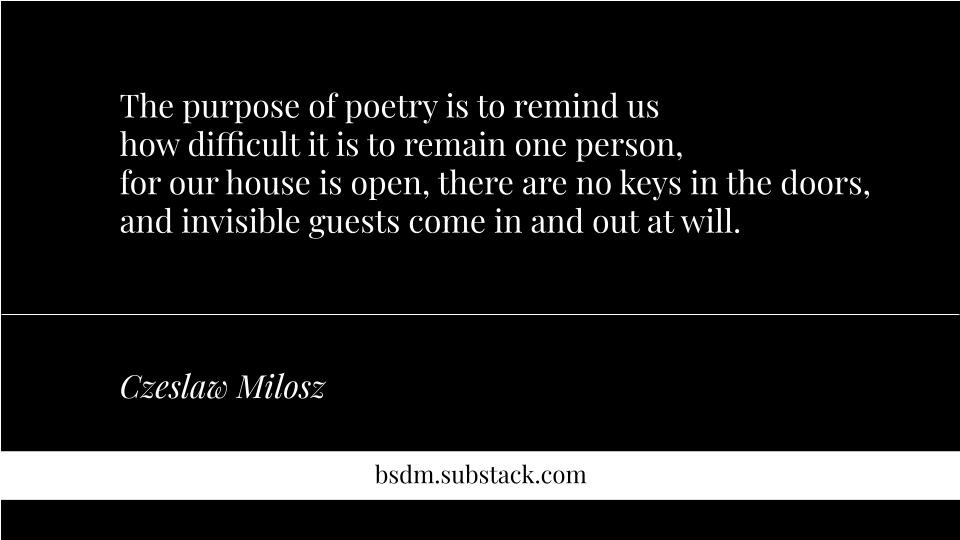Introduction and Consumer Safety Warning
Recently, someone I've known for 15 years asked me if I believe in God. So, I'm publishing this post with a few reflections in search of fruitful ways to ask and answer vague questions.
My name is Lev Janashvili, and I am the publisher of BS”D, a blog exploring human responses to fractal falsehood. If you find value in my work, you probably know what to do, but I'll tell you anyway: Subscribe to BS”D and check out my four other blogs, including MISM, M2D, DaaS, and my recently launched professional blog, which I’ve nicknamed LJ-Pro.
Consumer safety warning: Not all my content and not all my media are suitable for all consumers. Please consume at your own discretion. Take what you find good, true and beautiful and ignore the rest. As Avram Davidson argued: “Information is like food: some of it is nourishing, some of it is fattening, some of it is just plain poisonous.” You can’t outsource discernment.
Do I Believe in God?
1. The Problem with the Question
It’s been a very long time since anyone has asked me this question. It’s probably been even longer since I’ve posed this question to anyone. I don’t remember exactly when I stopped asking, but I know exactly why I stopped. The reason is that, in my experience, people don’t know how to ask the question and how to hear the response. Often, the person asking and the person responding both seem unaware of the obvious problem — the question is vague.
What makes the question vague? Well, the word “God” is vague. The word “believe” is vague. The word “I” is vague. And the auxiliary verb and the preposition don't add much clarity. Unless the participants in the conversation first acknowledge the vagueness of the question, the ensuing answers are bound to be, at best, absurd or masturbatory, or worse, divisive and destructive.
It won’t make much difference if the partners in this dialogue use a different formulation of the question such as “Does God exist?” Unless they approach the question in the right spirit — at least with some curiosity about its intersubjective meaning — the effect will likely be either wasteful or toxic, regardless of the phrasing of the question or the substance of the response.
2. None of the Above: Beyond the Three Classic Answers
Failure to acknowledge the vagueness of the question typically pulls people into the dialectical dance, a kind of perichoresis, of the three classic answers. Sometimes, the answer is “Yes. I believe in God” — that’s theism. Sometimes the answer is “No, I don’t believe in God” — that’s atheism. And sometimes the answer is “I don’t know” — that’s agnosticism. In my view, people espousing these answers as isms are often separated by pseudo-antagonisms and united by a fear of the epistemic Gordian Knot to which the question points.
If we expand the menu of ideological affinities to include pantheism and panentheism, the game becomes a bit more interesting, but the idea of God still seems to function as a mere shibboleth separating adherents, detractors and doubters into “us” and “them”. The spectacle often reminds me of the ancient parable of the elephant molested by blind gropers. In John Godfrey Saxe’s poetic rendition of the story:
So oft, in theologic wars
The disputants, I ween
Tread on in utter ignorance
Of what each other mean
And prate about an Elephant
Not one of them has seen!
3. Who’s Asking the Question? About Which God?
Overtime, I developed a handful of standard answers to questions from disputants in theologic wars. Depending on the context, I might respond to questions about God with “Which God do you mean?” or “I believe in all the gods.” Or, I might use a situationally appropriate quote from George Carlin, or I might hold a finger to my earpiece, close my eyes and say “Hold on, I’ve got God on the line. What do you want to know?” Obviously, these are all dismissive responses, ways of not answering the question.
When JJ asked me if I believe in God, I knew exactly which God he meant, but I didn’t feel the need to respond dismissively. In fact, for a moment, I didn’t respond to him at all. Instead, I silently asked myself: “Who is asking the question?” By that, I didn’t mean which person. I meant which state of mind, or self-state.1
The question was sparked by an interruption. It wasn't one of those painful interruptions that can derail a conversation. It was a fruitful interruption that reminded me that we all contain multitudes. When JJ first posed the question, I started to answer, but he stopped me and said something along the lines of: “Can you just give me a ‘yes’ or a ‘no’ so that we can get to the point I want to make?”
It was a sincere comment without a hint of hostility, but I immediately knew not only which God JJ was talking about, but also what part of him was talking. In JJ, I recognized my own younger, left-brain-dominant self with a tendency to black-and-white thinking, and in his question about “God”, I only heard a reference to a graven image, the god of silly debates and bumper stickers, easily reducible to yes-or-no, check-the-box classifications and pseudo-affinities.
I’m glad I didn’t respond dismissively to JJ when he was speaking in this self-state, when he seemed convinced that he had something figured out and that he just needed to use it to achieve a goal. If I had responded to JJ when he seemed tangled up in these certainty traps, I might have indeed derailed the conversation.
Instead, I drew his attention to the vagueness of the question and invited him to reflect. It took him a minute or two, during which I simply listened. Without any explicit prodding from me, JJ’s own response guided him into an unmistakably different self-state. Suddenly, he spoke of a different God, the God beyond the limits of language, the God who surpasses understanding. At times, the God he spoke of reminded me of Spinoza’s God. He spoke with awe, no longer trying to reduce reality to a bumper sticker.
I’m not saying I “believe” in this idea of God, but I think that, under the right circumstances, it’s at least worth talking about. However, the most appropriate response to what I heard from JJ in his new self-state was a silent appreciation. I felt no need to say ‘yes’ or ‘no’, to agree or disagree. Any such response would’ve only cheapened the beauty and integrity of what I heard. What I heard seemed untouched by the corrupting influence of fundamentalist and absolutist ideology. I felt grateful.
4. God as Reality: Deus Sive Natura
My answer to the question “Do you believe in God?” isn’t really about what’s true or false. It has more to do with who’s asking the question, and about which idea of God. However, for a public post, I don’t mind concluding here with a simple affirmative answer: I don’t need to believe in God. To me, “God” is synonymous with Reality.
Other Questions
Belief in God is only one of the questions that came up in my conversation with JJ. Other questions had to do with:
The meaning of atonement and forgiveness.
Responses to betrayal.
Martial arts as a metaphor for life and work.
The meaning of family.
The meaning of Jewishness.
The problem with Orthodox Judaism.
Writing my responses takes time, but I’m in no rush. Let me know what other questions feel most urgent and important to you, and we’ll see what happens. All in due time.
To receive future responses by email, subscribe to BS”D.
Related
Philip Bromberg is the psychoanalyst most closely associated with the concept of self-states. He writes that “health is the ability to stand in the spaces between realities without losing any of them—the capacity to feel like oneself while being many.”









There are many ways to "keep it real" when talking about God. Here's an example.
https://open.substack.com/pub/petethepolymath/p/the-love-hate-time-spiral?utm_source=share&utm_medium=android&r=4m5xhq